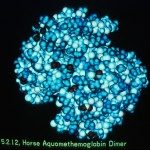Lien vers Pubmed [PMID] – 12847110
J. Biol. Chem. 2003 Sep;278(39):37400-8
Hepatocyte growth factor (HGF) is a pleiotropic factor that plays an important role in complex biological processes such as embryogenesis, tissue regeneration, cancerogenesis, and angiogenesis. HGF promotes cell proliferation, survival, motility, and morphogenesis through binding to its receptor, a transmembrane tyrosine kinase encoded by the MET proto-oncogene (c-met). Structurally speaking, HGF is a polypeptide related to the enzymes of the blood coagulation cascade. Thus, it comprises kringle domains that in some other proteins have been shown to be responsible for the anti-angiogenic activity. To check whether the isolated kringles of HGF were able to inhibit angiogenesis, we produced them as recombinant proteins and compared their biological activity with that of the recombinant HGF N-terminal domain (N). We showed that (i) none of the isolated HGF kringle exhibits an anti-angiogenic activity; (ii) N is a new anti-angiogenic polypeptide; (iii) the inhibitory action of N is not specific toward HGF, because it antagonized the angiogenic activity of other growth factors, such as fibroblast growth factor-2 and vascular endothelial growth factor; and (iv) in contrast with full-length HGF, N does not bind to the c-met receptor in vitro, but fully retains its heparin-binding capacity. Our results suggest that N inhibits angiogenesis not by disrupting the HGF/c-met interaction but rather by interfering with the endothelial glycosaminoglycans, which are the secondary binding sites of HGF.

